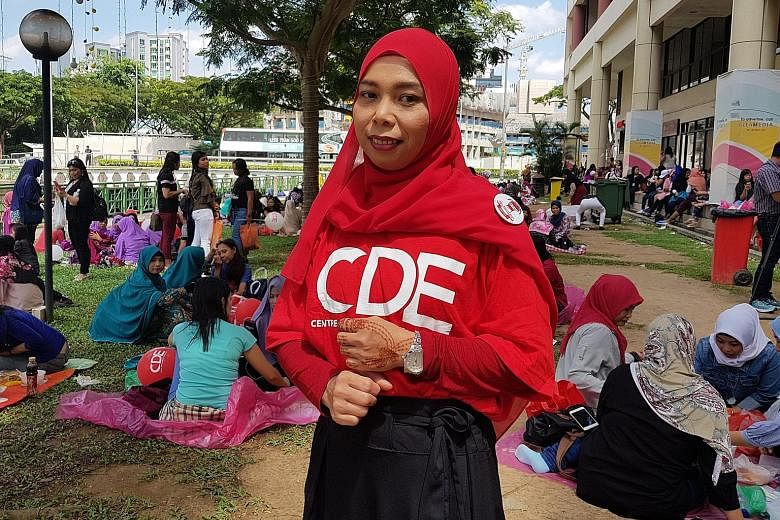An Indonesian maid was experiencing depression and had morbid thoughts when she picked up the phone one day last year to call her friend, Ms Rusmawati.
After the call, 36-year-old Rusmawati - also a domestic worker from Indonesia - made a decision that may have saved her friend's life. She alerted the Centre for Domestic Employees (CDE).
CDE and the police quickly contacted her friend, averting a tragedy. Today, the woman is doing better and gets regular counselling from CDE - a voluntary welfare organisation that looks after the interests of foreign domestic workers (FDWs).
At its second anniversary celebrations yesterday, this and other stories were recounted as CDE announced plans to double its maid shelter capacity and to roll out a skills certification course.
An annual CDE report showed a rise in the number of maids helped. CDE gave shelter to 141 maids last year, up from 110 in 2016. To cope with rising demand, CDE is doubling its shelter capacity to 200 spaces this year. CDE chairman Yeo Guat Kwang said: "The number of cases has increased. We need to quickly get a place to shelter more maids."
The boost in shelter space comes as the number of pay disputes stays high. Many maids seek shelter as disputes are being resolved. Of the 607 cases of help last year, pay disputes were the most common.
Since 2016, CDE has clawed back $113,668 from employers. This includes employers who failed to pay or withheld salaries for "safekeeping". Based on an average salary of $600, this represents nearly 190 months of unpaid wages.
The numbers are staggering, but there are still more cases that go unreported or cannot be resolved due to the employers' inability to pay, Mr Yeo said, adding: "We have to educate FDWs to come to us early. We have seen cases where... by the time we are aware, the employers may already be in financial difficulty."
More public education needs to be done to help maids understand their rights and to allay fears of coming forward, Mr Yeo said. "Many maids do not know that there is a scheme to allow them to change employers if they face a salary dispute. While the case is being resolved, CDE will be able to provide all assistance, including lodging," he said.
CDE hopes to offer training and certification programmes during the maids' stay at CDE shelters. It is working with training partners SkillsFuture Singapore and the NTUC Learning Hub on this. The "first cut" of a curriculum is done.
At the same time, CDE wants more employers to use e-payments, to minimise disputes. As at mid-December last year, 1,913 applications have been submitted to POSB to open special payroll accounts for foreign domestic workers, which CDE helped establish.
"We are also calling on the Government to make safekeeping of FDWs' salaries by employers illegal," said Mr Yeo, noting that this is a common cause of disputes.
Maids here say they are aware of the various avenues of help.
Ms Rusmawati said her voluntary work with CDE over the past 18 months has informed her about organisations and laws here that protect foreign domestic workers. "When I first came (more than 15 years ago), I could not go out with friends, call them on the phone or take a rest day. Now, because of CDE, I know more."
CDE has three offices, including its satellite offices at City Plaza and Peninsula Plaza. Talks are under way to open a fourth satellite office in Lucky Plaza.
Maids can also get help from the police, the Manpower Ministry and non-governmental groups like the Humanitarian Organisation for Migration Economics.
This is provided they are not deprived of communication or prohibited from taking rest days. Their social networks are their strongest weapon against any problem, several said.
Said Ms Siti Mu'minah, 33, who is from Indonesia: "Actually, I never heard of CDE before today. I am happy I have no problems. I have a good employer. But I know who to call when I need help."
Correction note: In an earlier version of the story, we stated that CDE has five locations. CDE has three offices. We are sorry for the error.


